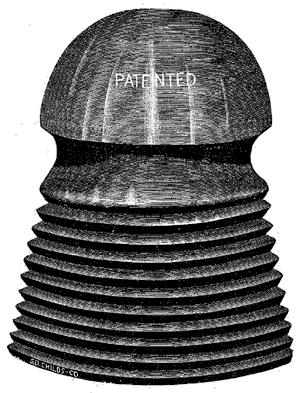[Trade Journal]
Publication: The Electrical Engineer
New York, NY, United States
vol. 10, no. 136, p. 659,661, col. 1,1
TRADE NOTES AND NOVELTIES
AND MECHANICAL DEPARTMENT.
·
·
THE BAIN INSULATOR
We present this week a cut of a new high resistance glass insulator, the invention of Mr. Foree Bain, of Chicago.
The insulator is made extra strong and is especially adapted to heavy work, such as carrying large primary wires, and particularly feeder wires for electric railroad work. The corrugations which are made both outside and inside of the apron increase the distance from the wire to the pin fully 100 per cent., and it is claimed that water will, in passing over the edges of the rings, become thin and broken, and on reaching the inside of the glass will drop off rather than creep over the inner obstructions to the pin.
Another point in favor of this form of insulator is that the many surfaces will reflect the light under the glass in such a way as to keep insects out, obviating a source of much annoyance where plain dark glass is employed.
 |
| The Bain Insulator. |
This insulator will cost a little more to manufacture than the ordinary plain glass insulator, but the inventor claims that an advance of a few cents per mile in the cost of construction will not be any objection where a high class of work is desired.
Mr. Bain has assigned his patent to the Central Electric Company, of Chicago, who are now sole owners and by whom the article is being placed upon the market.
